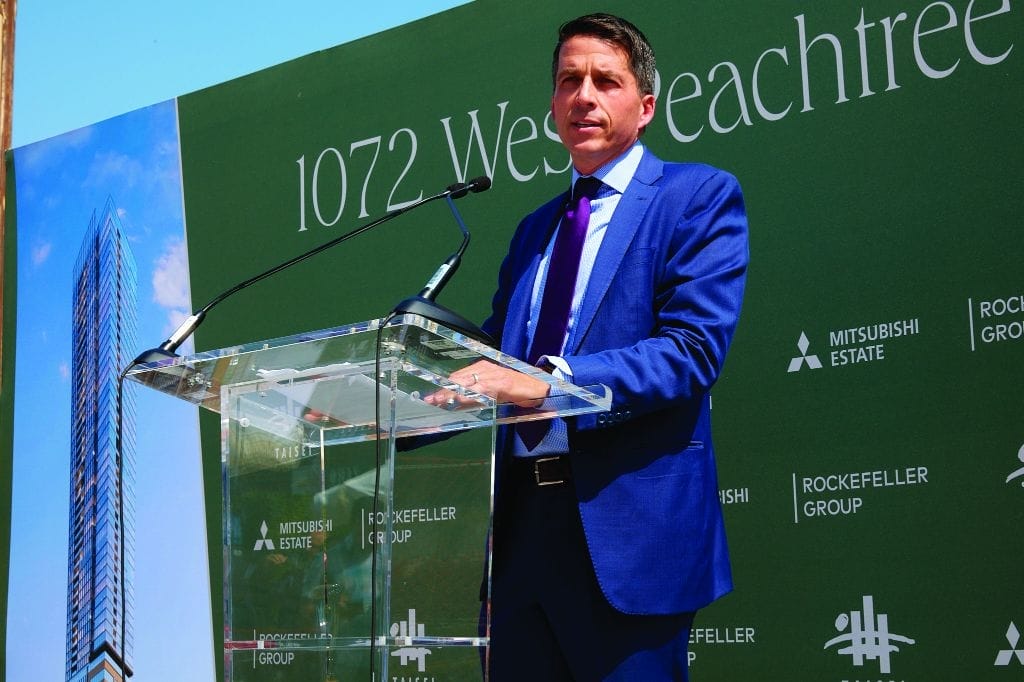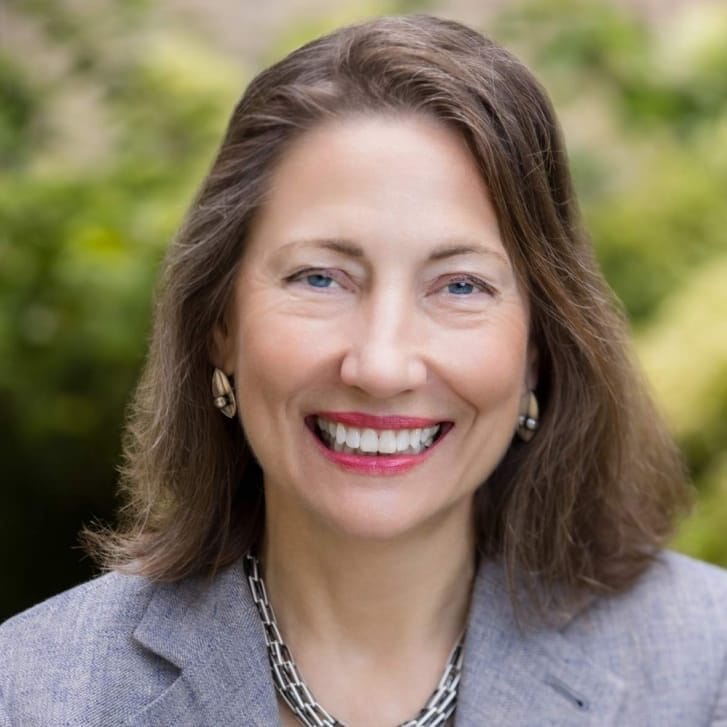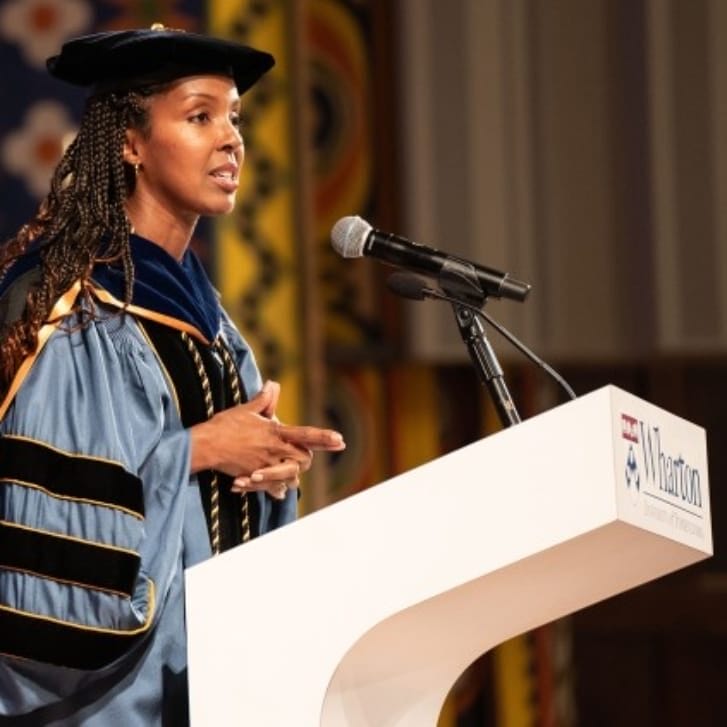Whether it’s in a mess hall or in a corporate board room, “Officers Eat Last” is a military mantra that has shaped the leadership style of Daniel Moore WG00, CEO and President of Rockefeller Group. As an Air Force captain, it meant making sure everyone of a lower rank made it through the chow line before you did; as a real estate executive, it means providing employees the materials and resources they need before worrying about yourself.
Like many veterans, Moore carved his own path from cadet to corporate executive. Service was a family affair: His father was a career Air Force officer, both of his grandfathers served in World War II, and he can trace back ancestors to the Civil War. There was no question Moore would continue the family tradition, but the road forward would take some twists and turns.
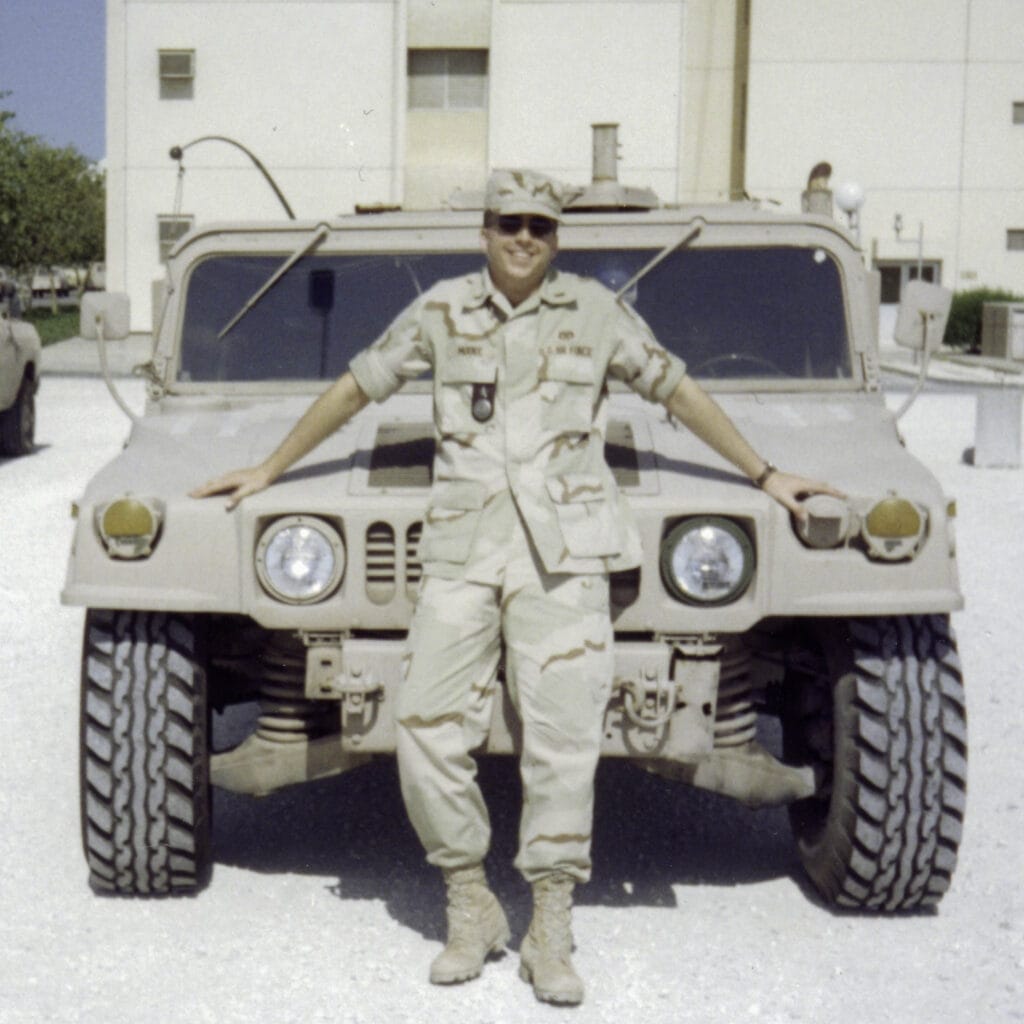
Moore in Saudi Arabia in 1996.
After studying structural engineering at the University of Notre Dame on an Air Force ROTC scholarship, Moore was commissioned as second lieutenant. His deployments as a civil engineer officer included the Pacific Northwest, Washington DC and two tours in the Middle East. But it was in a desert west of Cairo where he grew as a leader. In a month-long training exercise with the Egyptian Air Force, Moore was responsible for a team of engineers and firefighters—overseeing every detail from setting up the exercise to making sure the 18-to-21-year-old airmen didn’t get too rowdy while experiencing the city’s culture and nightlife.
Although Moore was grateful for the level of responsibility he received at such a young age, he was ready for a new challenge: “As you get higher and higher in rank, particularly in the Air Force, if you’re not a flyer, the career field gets really narrow really quick.”
It was around then that a friend’s father suggested something broader: an MBA. Moore arrived at Wharton in 1998, during what he calls the “Internet 1.0” era. While everyone was fascinated with the dot-com bubble, something unexpected clicked with Moore: real estate development. The physical nature of the built environment appealed to his technical engineering background, but the new skill of deal negotiation was what really hooked him.
“It’s not what you see in the movies,” he says. “It’s not someone writing a number on a piece of paper and sliding it over to you. There are ways to purposely prepare for a negotiation and be effective and create value for yourself and for others. It’s been a huge asset for me professionally for 20 plus years.”
In fact, Moore still has a binder of notes from Legal Studies & Business Ethics Professor Stuart Diamond’s negotiation class that he has come back to several times to reference processes and checklists. Moore also valued his time in Real Estate Professor Asuka Nakahara’s class, and has even returned as a guest speaker to present a case study from Rockefeller Group. “He had high standards,” Moore says of Nakahara. “You had to be very clear in your presentations, and a lot of the discipline that he instilled in us on how to think about a project I’ve used over and over again.”
It takes courage to switch any career, but it can be particularly challenging for veterans looking to pivot from the jobs they had in the military and to deviate from the clear track they were on. Moore considers Wharton’s network and exposure an advantage in that regard—in addition to a long tradition of veterans in the MBA program, the Wharton Veterans Club serves as both a community and professional resource for students, as well as both a guide for potential applicants and a link to veteran alumni. Moore also sees how veterans can feel at home with the international mindset and diversity that is ingrained in the School’s culture. “When you combine that Wharton education with the time in the military, that creates a really compelling package for employers,” he says.
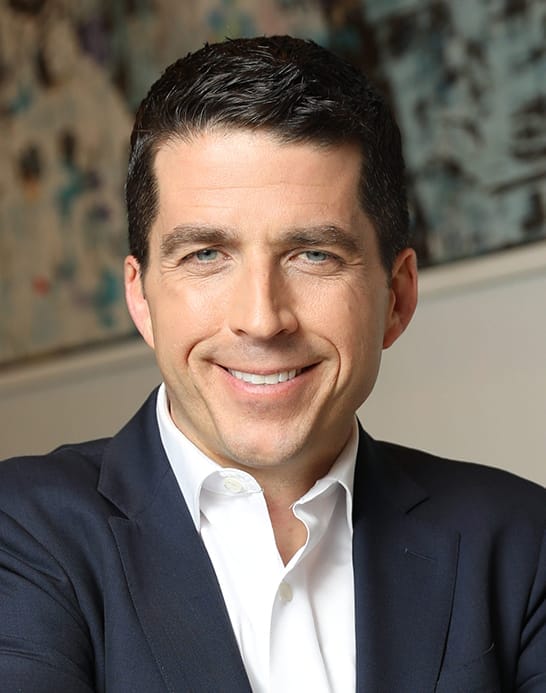
Moore was named President and CEO of Rockefeller Group in 2018. His notable projects include NYC’s 1271 Avenue of the Americas.
Now managing over 200 employees at Rockefeller Group, Moore still relies on his military training, especially the mistakes (which he calls “the best teachers”) that he made as a young officer. Leading a 95-year-old New York City real estate firm through the pandemic was one of those trying times when the “Officers Eat Last” mentality proved beneficial. “Your role as a leader of an organization or a team or a functional area is about providing your team what they need to be successful,” he says.
The Air Force taught Moore crisis management, which meant identifying tasks that needed to be prioritized, overseeing the pace of operations, and communicating it all with a clear direction. Those skills came in handy when navigating COVID with tenants and helping businesses in Midtown Manhattan come back. Now, the multi-billion-dollar real estate company has expanded to Brooklyn, Denver, Atlanta, and Texas.
Among the ways Moore stays connected with Wharton is by supporting current MBA students through fellowship support. For veterans starting at the School, Moore says to use the time—20 short months—wisely. “The best thing you can possibly do is get uncomfortable and try everything,” he says.
He pointed out how veterans have a unique challenge of leaving a structured environment and mindset for an open-ended campus with countless choices. He says to avoid the urge to follow the trendy industry of the moment and tap into your leadership quality to find what fits.
“Don’t just create financial opportunities, because you’re going to have the financial opportunities coming out of it, but really seek to find that thing that feels aligned with your skills and abilities and interests and talents. It’s going to feel like work that’s worth doing when you walk out the door after graduation.”




















